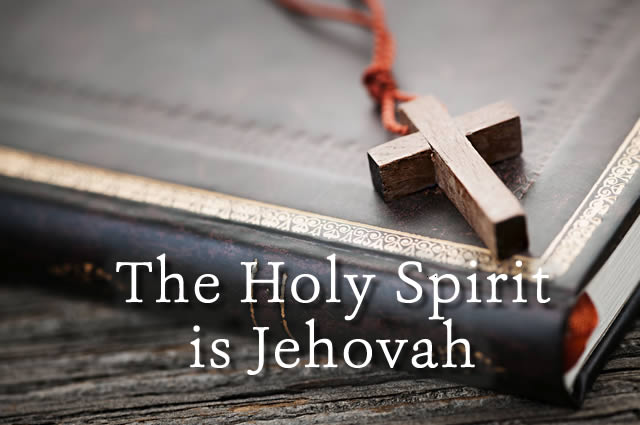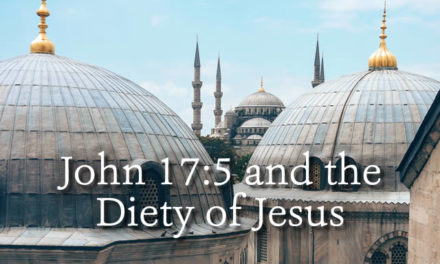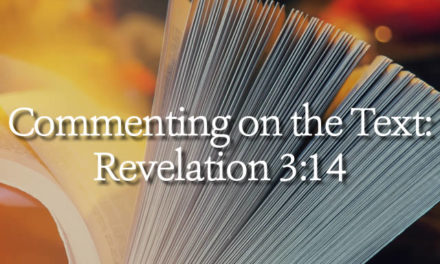The scriptures and Trinitarian doctrine recognizes the divine equality of the Holy Spirit with the Father and Son. In His nature the Spirit of God is as much deity as is the Father. The Holy Spirit is Jehovah (Yahweh), just as the Father is Jehovah and the Son is Jehovah.
However, the scriptures do not focus on the Spirit as they do the Son. The Holy Spirit is active in the background in the works of God such as creation and redemption. Though He can certainly be found in all the works of God His role is to point us to the Son and not to Himself. For this reason the volume of texts we have as evidence for His deity is less than that of Jesus’ deity.
The deity of the Holy Spirit has been less frequently discussed by the anti-trinitarians than His personality. The reason for this is logic. If the Spirit is not possessed of personality, as they claim, then how can He be thought of as deity? Since the bible knows of no impersonal deity the anti-trinitarians seldom address the question.
If His personality is ever acknowledged then His deity must logically follow because the anti-trinitarians have de-facto acknowledged His eternity. They have done this by claiming that the Holy Spirit is the ‘power’ of God in all His acts. But, since God is eternal then they must acknowledge that the Holy Spirit has always existed as His ‘power’. You cannot have a second eternal being exercising almighty power who is not Jehovah.
What follows are some of the scriptural evidences for the deity of the Holy Spirit.
Called God
Acts 5:3,4 – “…why hath Satan filled thine heart to lie to the Holy Ghost, and to keep back part of the price of the land?… thou has not lied unto men, but unto God.”
Jehovah’s Witnesses will answer this by saying that if the Spirit is Jehovah’s ‘power’ then it stands in the place of Jehovah, therefore, Jehovah is lied to. This is somewhat logical if taken in isolation. The scriptural basis for the Spirit’s deity is not based on an isolated text, but on numerous passages. However, if the Spirit is possessed of personality then He is Jehovah. The previous issue of this publication documents His personality and should be referred to when this rebuttal is attempted.
Shared Attributes
Among the attributes of God are His Omnipotence, Omniscience, Omnipresence, and Eternity. These attributes are held by each of the Persons of the Godhead. The following are scriptural examples related to the Spirit.
Omnipotent – Isaiah 40:12-14 – “Who hath measured the waters in the hollow of his hand, and meted out heaven with the span,…? Who hath directed the Spirit of the LORD, or being his counsellor hath taught him?”
A similar question is asked about God at Romans 11:34, “For who hath known the mind of the Lord? Or who hath been his counsellor?”
The work of creation is the exercise of almighty power. It is the work of Jehovah alone, Father, Son, and Holy Spirit. If an attribute, or action, that is in the province of God alone, is attributed to other Persons than the Father, then that other Person, or Persons, logically must be of the same divine essence as the Father. Otherwise, you have a logically contradictory record that would undermine the doctrine of inspiration.
This is one of the ways the concept of the Tii-unity developed. The early church fathers, and some rabbinic scholers in Jesus time, saw the works of God shared among ‘others’ who seemed a part of the deity they worshipped. Since the Trinity is so well documented in scripture it is only the anti-trinitarians who have a problem.
As an aside, when Jehovah’s Witnesses come to your door, ask them to give you an example of almighty power being exercised. They will probably cite creation, bringing the Universe into existence out of nothing. Ask them whether this act of creation was carried out by Jesus. Since this is what they believe they will affirm it. Then point out to them that they are saying Jesus was almighty!
Omniscient – I Corinthians 2:10,11 – “But God hath revealed them unto us by his Spirit: for the Spirit searcheth all things, yea, the deep things of God. For what man knoweth the things of a man, save the spirit of man which is in him? Even so the things of God knoweth no man, but the Spirit of God.”
To say that the Spirit knows the deep things of God is to say that He possesses omniscience for God’s knowledge is unlimited and total. Whatever God knows the Spirit knows.
Omnipresent – Psalm 139:7 – “Whither shall I go from thy spirit? Or whither shall I flee from thy presence?”
An interesting note about this verse is that the Hebrew word for “presence” is panim. It literally means ‘faces’. Why is it plural if only one Person, the Father, is God? However, if there are three Persons who are the one God, then the plural would be appropriate.
God is present everywhere. No one can flee from Him. For Christians, the omnipresent Holy Spirit can dwell in each of us as Paul said in I Corinthians 6:19, “What? Know ye not that your body is the temple of the Holy Ghost which is in you, which ye have of God, and ye are not your own?”
Who but God dwells in a temple of God? To confirm that Paul says in II Corinthians 6:16, “…for ye are the temple of the living God….”
Eternal – Hebrews 9:14 – “How much more shall the blood of Christ, who through the eternal Spirit offered himself without spot to God, purge your conscience from dead works to serve the living God.”
The ‘eternal’ Spirit! Eternal is defined as without beginning or end.
Shared Functions
Sending Laborers – Matthew 9:38, “Pray ye therefore the Lord of the harvest, that he will send forth labourers into his harvest.”
Compare this with Acts 13:2-4, “…the Holy Ghost said, ‘Separate me Barnabas and Saul for the work whereunto I have called them…. So they, being sent forth by the Holy Ghost, …”
Creator – Genesis 1:1, “In the beginning God created the heaven and the earth.”
Compare this with Job 33:4, “The spirit of God hath made me, and the breath of the Almighty hath given me life.”
Resurrection – Romans 8:11, “But if the Spirit of him that raised up Jesus from the dead dwell in you, he that raised up Christ from the dead shall also quicken your mortal bodies by his Spirit that dwelleth in you.”
I Peter 3:18 – “…being put to death in the flesh, but quickened by the Spirit.”
Jesus’ resurrection was accomplished by God the Father (Acts 2:24, “Whom God hath raised up….”), and by Jesus Himself (John 2:19-21, “Destroy this temple and in three days I will raise it up….”). The three Persons of the Trinity are here shown to be involved in the resurrection of Christ.
The typical pattern in God’s actions are that everything is OF the Father, BY the Son, and THROUGH the Spirit. Our salvation is OF the Father by His sending His Son. It is BY the Son through His death and resurrection, and THROUGH the enlightening, convicting and regenerating work of the Spirit in our hearts.
Conclusion
With the illumination of the Trinity in the New Testament we can look back at curious passages in the Old Testament and see the earliest indications of a plurality of Persons in the Godhead. And with clear evidence of the Spirit’s personality and deity we see other passages that tend to confirm the clear evidence.
In numerous passages the Holy Spirit is named together with the Father and Son. Such familiar passages as the baptismal formula and the benediction of Paul in II Corinthians link the three Persons of the Trinity in such a manner as to show equality.
Matthew 28:19, “…baptizing them in the name of the Father, and of the Son, and of the Holy Ghost.”
II Corinthians 13:14, “The grace of the Lord Jesus Christ, and the love of God, and the communion of the Holy Ghost, be with you all.”
In another Old Testament passage there is a very unusual text that seems almost New Testament in its wording. All three Persons of the Trinity are named. The speaker in this passage is clearly identified as God in verses nine through 12. The same speaker, God, continues to speak throughout the entire passage.
Isaiah 48:12,16, “Hearken unto me, O Jacob and Israel, my called; I am he; I am the first, I also am the last…. Come ye near unto me, hear ye this; I have not spoken in secret from the beginning; from the time that it was, there am I: and now the Lord God, and his Spirit, hath sent me” (i.e., Jehovah – Jesus).
There is a phrase in Isaiah 6:3 and Revelation 4:8 that commentators call the Trisagion. It is the threefold “Holy, holy, holy” that many commentators understand to refer to the three Persons of the Trinity.
Holy is the Father,
Holy is the Son, and
Holy is the Spirit.
By David Henke






